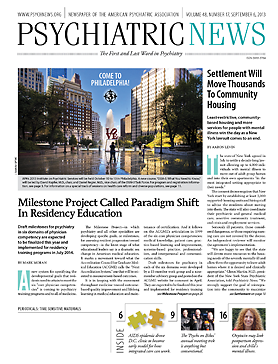A bill that would permanently replace the sustainable growth rate (SGR) formula for Medicare payment was approved in early August, with bipartisan support, by the powerful House Energy and Commerce Committee.
The Medicare Patient Access and Quality Improvement Act (HR 2810) would repeal the SGR formula and replace it with a permanent 0.5 percent update modified by quality performance in a new Update Incentive Program (UIP). Performance under the UIP would be based on quality measures and clinical practice improvement activities developed by the secretary of Health and Human Services in collaboration with the relevant medical societies.
Under the legislation, beginning in 2019 physicians could earn an additional 1 percent for successful participation; those who score below a quality threshold would be subject to a 0.5 percent decrease. Physicians may opt out of this new system by participating in a qualifying alternative payment model (APM).
For years, APA, the AMA, and other physician groups have repeatedly called for reform of the payment formula and elimination of the SGR, which requires that increases in Medicare volume be offset by reductions in physician reimbursement without taking into account rising medical expenses. For a decade now, the SGR has resulted in ever-more-draconian cuts in physician pay being proposed by the Centers for Medicare and Medicaid Services, only to be averted at the last minute by congressional action.
Nicholas Meyers, director of APA’s Department of Government Relations, characterized the bill as a promising first step toward elimination of the SGR. But he added that it faces a number of legislative hurdles—the House Ways and Means Committee and the Finance Committee have yet to review the bill.
Also, there are substantive issues in the legislation of concern to APA and other physician groups. Chief among these is how elimination of the SGR would be paid for; the accumulation of years of deferred costs every time Congress has intervened to avert a scheduled pay cut means that repealing the SGR now comes with a price tag of nearly $140 billion.
Meyers noted that as currently drafted, the bill leaves open the possibility that dollars for deficit reduction could come out of physician reimbursement—something APA and other groups strongly oppose.
In a letter dated July 24 to the Energy and Commerce Subcommittee on Health—after that subcommittee had unanimously approved the bill—APA Medical Director and CEO James H. Scully Jr., M.D., said APA was encouraged by the following points in the legislation:
Full and permanent SGR repeal.
A five-year stability period with positive updates before a new quality incentive program is activated. A sufficient stability period is necessary to ensure physician and industry education, preparation, and testing of APMs and quality initiatives.
Collaboration between the secretary of Health and Human Services and state and national medical specialty organizations like APA on quality-improvement provisions.
Creation of an administrative pathway that encourages transition toward APMs while preserving a viable fee-for-service option.
He recommended three changes to the draft legislation: payment updates based on the Medicare Economic Index to keep up with inflation and maintain physician participation in Medicare; increasing payments for cognitive, or nonprocedural, services relative to procedural services to incentivize the management of patients with chronic conditions; and incorporating deficit neutrality in the physician-payment reporting system to improve accuracy of relative values, so that payment for undervalued and properly valued codes can be, respectively, increased and maintained. ■
